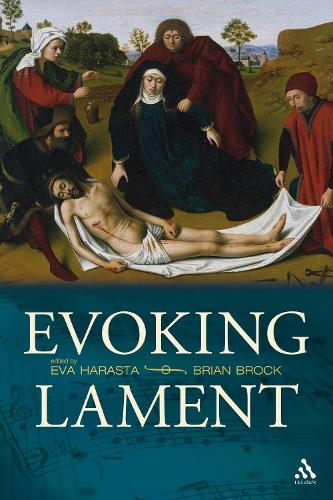
Evoking Lament: A Theological Discussion
(Paperback)
Available Formats
Publishing Details
Evoking Lament: A Theological Discussion
By (Author) Dr Eva Harasta
By (author) Dr Brian Brock
Bloomsbury Publishing PLC
T.& T.Clark Ltd
10th October 2009
United Kingdom
Classifications
Tertiary Education
Non Fiction
Theology
231
Physical Properties
Paperback
240
Width 156mm, Height 234mm
340g
Description
Harasta and Brock show how lament seems to introduce notes of mistrust into an otherwise confident relationship with faith, God and His will. In prayer all experiences may be brought to God in openness and trust. Yet lament seems to introduce notes of mistrust into a relationship properly characterized by confident faith in God and His will. Sustained attention to lament presents a challenge to theological reflection in reminding it of the acuteness of the experience of suffering and evil. This volume suggests that a robust concept and practice of lament is an appropriate response to questions of evil and suffering in its refusal to close off questions that cannot and should not be closed. Lament takes place in the eye of the storm of theodicy, and when the distinct content of Christian lament is discovered here the question of theodicy is transformed. The first section reflects on the anthropological conditions of lament, describing it as a hermeneutic for negotiating adverse experiences that transcends the simple opposition of innocent suffering and guilt. The second section reflects on why and how lament has faded from modern theological thought that is over reliant on systematic accounts of evil and whose abstractions have drifted free of religious experience. The third section develops an understanding of trust that includes expressions of lament while not sanitizing its rawness. The final section inquires after the distinct Christian profile of lament. Lament, even as an experience of isolation, stands within the believing community and its traditions. Moreover, because Christian lament is based on Christ's passion and resurrection, Christ endorses and shapes the believers' lament as he shapes their praise.
Reviews
The lament as a form of prayer is the subject of much biblical interpretation as well as discussion about its role in the prayer life of individuals and congregations. Evoking Lament is a significant step forward as it brings systematic theology into the conversation and uncovers both problems and possibilities with the church's appropriation of lament. There is no single perspective in view, but the cultural and personal dimensions of lament as Christian prayer are subjected to various theological illuminations and the issues of suffering and theodicy, inherent in the very phenomenon of lament, are dealt with in profound and engaging ways. All the essays are provocative and informative, showing once again how much theological voices have to contribute to hearing the Scriptures more clearly and more deeply.' - Patrick D. Miller, Princeton Theological Seminary, Princeton, NJ, USA. -- Patrick D. Miller
What is lament What are its effects in personal and in public life How does it shape piety and its relation to God In this book, an international and interdisciplinary group of twelve young scholars deals with these questions. They focus on aspects such as lament as a response to pain - and as a response to evil; lament of the helpless - and of the guilty; lament of justice - and of love; lament as a radical form of the question of theodicy - and as an indirect doxology; lament for our sakes - and for God's sake. The tensions addressed here lead to provocative insights and promise an illuminating reading.' - Michael Welker, Faculty of Theology Heidelberg University, Heidelberg, Germany -- Michael Welker
This volume demonstrates convincingly that lament merits a central place in Christian theology and worship. The various essays explore how lament is related to despair and hope, to guilt, trust, and praise, and alsoto the perennial and deeply biblical problem of theodicy. Such a nuanced and multi-faceted theological understanding is essential for the responsible Christian practice of lament.' - Ellen F. Davis, Duke Divinity School, Durham, NC, USA -- Ellen F. Davis
This excellent book speaks to us with new promise about the oft forgotten practice of lament and opens up a theological conversation that is long overdue. Lamenting faithfully is a vital gift that is central to the practices of the church. The author's of this book help us to accept that gift and to understand why it may be difficult for us to do so. Lament may have been in some senses forgotten but it is imperative that it is remembered. The book is a major contribution to theology and the practices of the church.' - John Swinton, School of Divinity, History and Philosophy, King's College, University of Aberdeen, UK. -- John Swinton
"Theologians, most from Europe, investigate why lament is an essential theme in theological ethics and dogmatics. They cover lament and the phenomenon of suffering, the assault of lament on systematic thought, lamenting for God's sake, and lamenting in Christ. Among specific topics are the entwining of suffering and guilt in lament, Hegel and Barth as diametrically opposed brothers in the spirit of modernity, the heterogeneity of the New Testament's statements on lament and Augustine's incitement to lament from the Enarrationes in Psalmos." -Eithne O' Leyne, BOOK NEWS, Inc.
mention in Interpretation, July 2010
Altogether these essays represent a powerful call to take lament seriously in the Western church. The scholarship is erudite and convincing... I recommend this book for all seminary libraries. In addition, seminary professors might find some selections herein useful for courses on prayer or evil.' -- Theology, Ethics and Philosophy
Author Bio
Dr Eva Harasta is Research Assistant in Systematic Theology and Contemporary Theological Issues at the University of Bamberg, Germany. Brian Brock is a Reader in Moral and Practical Theology at the University of Aberdeen, UK.
